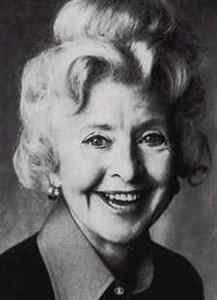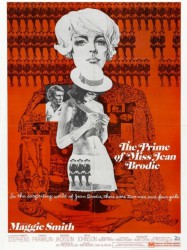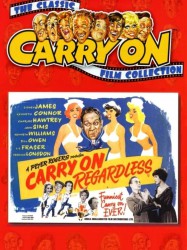Molly Weir est une Actrice Britannique née le 17 mars 1910 à Glasgow (Royaume-uni)

Mary Weir, known as Molly Weir (17 March 1910 – 28 November 2004) was a Scottish stage actress, most notable for her role as the long-running (1977–1984) character Hazel the McWitch in the BBC TV series Rentaghost. She was the sister of naturalist and broadcaster Tom Weir.
Born in Glasgow and brought up in the Springburn area of the city, Weir began in amateur dramatics. In her early professional career, she was a well-known radio actress, featuring in many comedy shows, such as ITMA. She made her film debut in 1949, and had a regular role as the housekeeper, Aggie McDonald, in the radio and television sitcom Life With The Lyons. During the 1970s and early 1980s she became famous as a writer, with several volumes of best-selling memoirs, notably, Shoes Were For Sunday. She also appeared in a series of television advertisements for Flash the household cleaning agent. In 1969 she appeared in The Prime of Miss Jean Brodie starring Dame Maggie Smith. She and Helena Gloag played the Kerr sisters, the sewing mistresses of Marcia Blaine School for Girls. In 1970 Weir and Gloag reprised their collaboration in Scrooge, playing old sisters in debt to Mr Scrooge, played by Albert Finney.
In the 1970s she was one of the presenters of Teatime Tales, a television series broadcast by STV in which she recalled her childhood. The series also featured Lavinia Derwent and Cliff Hanley. In the 1980s, she lampooned this homely image in the comedy series Victoria Wood As Seen On TV and appeared in a pop video for the Bluebells 1983 hit Young At Heart.
The Scottish Rock band The Vaselines song Molly's Lips which was famously covered by Nirvana was said to be inspired by Weir.
After her death, Molly Weir's ashes were scattered on the banks of Loch Lomond, a favourite holiday location ; and almost all her estate (of nearly £1.9 million), was bequeathed to charities.
Source : Wikidata
Molly Weir

- Infos
- Photos
- Meilleurs films
- Famille
- Personnages
- Récompenses
Nationalité Royaume-uni
Naissance 17 mars 1910 à Glasgow (Royaume-uni)
Mort 28 novembre 2004 (à 94 ans) à Pinner (Royaume-uni)
Naissance 17 mars 1910 à Glasgow (Royaume-uni)
Mort 28 novembre 2004 (à 94 ans) à Pinner (Royaume-uni)
Mary Weir, known as Molly Weir (17 March 1910 – 28 November 2004) was a Scottish stage actress, most notable for her role as the long-running (1977–1984) character Hazel the McWitch in the BBC TV series Rentaghost. She was the sister of naturalist and broadcaster Tom Weir.
Born in Glasgow and brought up in the Springburn area of the city, Weir began in amateur dramatics. In her early professional career, she was a well-known radio actress, featuring in many comedy shows, such as ITMA. She made her film debut in 1949, and had a regular role as the housekeeper, Aggie McDonald, in the radio and television sitcom Life With The Lyons. During the 1970s and early 1980s she became famous as a writer, with several volumes of best-selling memoirs, notably, Shoes Were For Sunday. She also appeared in a series of television advertisements for Flash the household cleaning agent. In 1969 she appeared in The Prime of Miss Jean Brodie starring Dame Maggie Smith. She and Helena Gloag played the Kerr sisters, the sewing mistresses of Marcia Blaine School for Girls. In 1970 Weir and Gloag reprised their collaboration in Scrooge, playing old sisters in debt to Mr Scrooge, played by Albert Finney.
In the 1970s she was one of the presenters of Teatime Tales, a television series broadcast by STV in which she recalled her childhood. The series also featured Lavinia Derwent and Cliff Hanley. In the 1980s, she lampooned this homely image in the comedy series Victoria Wood As Seen On TV and appeared in a pop video for the Bluebells 1983 hit Young At Heart.
The Scottish Rock band The Vaselines song Molly's Lips which was famously covered by Nirvana was said to be inspired by Weir.
After her death, Molly Weir's ashes were scattered on the banks of Loch Lomond, a favourite holiday location ; and almost all her estate (of nearly £1.9 million), was bequeathed to charities.
Le plus souvent avec
Filmographie de Molly Weir (19 films)
Actrice

Objectif Lotus (1975)
, 1h40Réalisé par Robert Stevenson, Art Stevens, Wolfgang Reitherman, John Lounsbery
Origine Etats-Unis
Genres Drame, Thriller, Comédie, Action, Aventure
Thèmes Mise en scène d'un animal, Dinosaure, Espionnage, La préhistoire, Animaux préhistoriques, Films pour enfants
Acteurs Peter Ustinov, Helen Hayes, Clive Revill, Derek Nimmo, Percy Herbert, Hugh Burden
Rôle Scots Nanny
Note58%





Lord Southmere, agent secret britannique, vole un microfilm qui contient le secret du lotus X. Poursuivi par Hnup Wan, membre aguerri des services secrets de l'Empire du soleil, il est enlevé après avoir caché le microfilm dans le squelette d'un diplodocus du Muséum national d'histoire naturelle.

Assassin (1973)
, 1h23Réalisé par Peter Crane
Origine Royaume-uni
Genres Drame, Thriller
Acteurs Ian Hendry, Edward Judd, Frank Windsor, Ray Brooks, Mike Pratt, Paul Whitsun-Jones
Rôle The Wife
Note59%





The British government hires an assassin to kill a Ministry of Defence official suspected of leaking secrets.

Bless This House (1972)
, 1h27Réalisé par Gerald Thomas
Origine Royaume-uni
Genres Comédie
Acteurs Diana Coupland, Sid James, Terry Scott, June Whitfield, Peter Butterworth, Sally Geeson
Rôle Mary's Mother
Note61%





1970s English suburbia: middle-aged homeowner Sid Abbot just wants to get on with building his illegal whisky still, but is frustrated by his workshy son, and otherworldly daughter. Then the rude and arrogant Ronald Baines and his family move in next door.

Scrooge (1970)
, 2hRéalisé par Ronald Neame
Origine Royaume-uni
Genres Drame, Science-fiction, Fantasy, Musical
Thèmes La musique, Noël, Voyage dans le temps, Fantômes, Musique
Acteurs Albert Finney, Alec Guinness, Edith Evans, Kenneth More, Michael Medwin, Laurence Naismith
Rôle 1st Woman Debtor
Note74%





À Londres, Ebenezer Scrooge est un misanthrope qui déteste Noël et qui ne vit que pour l'argent et le profit. Après qu'il a fait peur à un groupe de gamins qui chantaient une comptine à sa porte, il refuse l'invitation de son neveu Fred pour le réveillon. Après le départ de Fred, il donne congé pour le lendemain à Bob Cratchit, un de ses employés, mais en lui rappelant qu'il devra être là le matin suivant. Il est abordé par deux hommes qui lui demandent de faire un don pour les pauvres, ce qu'il refuse évidemment avec vigueur. En rentrant chez lui, il croise certains de ses clients, à qui il rappelle qu'ils sont ses débiteurs. Le soir, après le repas, il reçoit la visite du fantôme de Marley, son ancien associé, qui l'informe qu'il va voir trois apparitions dans la nuit à venir. Peu après la disparition de Marley, le fantôme des Noëls passés apparaît et emmène Scrooge dans le passé, au temps de sa jeunesse et de la cour qu'il faisait alors à Isabel Fezziwig. Le fantôme lui reproche alors d'avoir abandonné Isabel pour gagner toujours plus d'argent. Dès que ce fantôme disparaît, apparaît celui des Noëls présents, qui emmène Scrooge chez Bob Cratchit. Ils y voient les Cratchit préparer joyeusement le dîner du réveillon, malgré leur pauvreté. Parmi les cinq enfants de Cratchit, Scrooge est particulièrement ému par Tiny Tim, qui est handicapé. Le fantôme ramène Scrooge chez lui, où l'attend le fantôme des Noëls futurs, qui l'emmène sur la tombe de Tiny Tim. Le vieil homme est encore plus choqué lorsque le fantôme lui montre qu'il finira enchaîné aux enfers. En se réveillant le matin de Noël, Scrooge se rue hors de chez lui avec la ferme intention de célébrer Noël. Il achète une dinde et des jouets, puis se rend chez Cratchit. Surpris de voir son changement d'attitude, la famille l'accueille volontiers.
 , 1h56
, 1h56Réalisé par Ronald Neame
Origine Royaume-uni
Genres Drame
Thèmes Le thème de l'éducation, Films pour enfants
Acteurs Maggie Smith, Robert Stephens, Celia Johnson, Pamela Franklin, Gordon Jackson, Jane Carr
Rôle Miss Allison Kerr
Note75%





Pendant l'entre-deux-guerres, une jeune professeure d’Édimbourg travaillant dans une école pour filles apprend à ses élèves l'amour, la politique et les arts plutôt que les matières traditionnelles. Adepte d'une certaine discipline, elle développe une grande admiration pour Mussolini ainsi que pour Franco. Elle a des liaisons avec deux de ses collègues enseignants, ce qui finit par compromettre sa situation. Pensant pouvoir compter sur le soutien indéfectible de ses élèves préférées, elle s'aperçoit qu'elle ne constitue plus leur préoccupation première, car elles commencent à expérimenter la vie et l'amour par elles-mêmes...

Carry On Regardless (1961)
, 1h30Réalisé par Ralph Thomas, Gerald Thomas
Origine Royaume-uni
Genres Comédie
Thèmes Sexualité, Erotique
Acteurs Sid James, Kenneth Connor, Charles Hawtrey, Joan Sims, Kenneth Williams, Bill Owen
Rôle Bird Woman
Note60%





Il est ébats non-stop comme Carry On équipe livrer la marchandise dans l'une des plus rudes et les plus drôles du Carry On films. Le casting sont tous en pleine forme comme une bande de non-trémies qui se joignent à une agence dans la recherche d'un emploi. L'anarchie monte comme ils le font une série de petits boulots, y compris une partie de thé chimpanzés, en essayant de rester sobre à une dégustation de vin et de démolir une maison.

What a Whopper (1961)
, 1h30Origine Royaume-uni
Genres Comédie
Acteurs Adam Faith, Sid James, Carole Lesley, Terence Longdon, Clive Dunn, Freddie Frinton
Rôle Teacher
Note53%





Un écrivain tente d'obtenir de l'argent en écrivant un livre sur le monstre du Loch Ness. Aucun éditeur ne le prendra parce qu'ils pensent tous qu'il n'y a pas vraiment de monstre. L'écrivain et certains de ses amis font un faux monstre et prennent des photos avant de se rendre en Écosse pour voir s'ils peuvent convaincre les locaux.

The Bridal Path (1959)
, 1h35Réalisé par Frank Launder
Origine Royaume-uni
Genres Comédie, Comédie romantique
Acteurs Bill Travers, George Cole, Annette Crosbie, Dilys Laye, Eddie Byrne, Terry Scott
Rôle 2nd Waitress
Note67%





Ewan McEwan, an easy-going sheep and corn farmer on a remote Scottish island, is unable to marry his childhood sweetheart Katie as her hell-raising preacher father is opposed to consanguinity - all the islanders are related to each other. When Katie leaves for Glasgow to train as a nurse, he decides to find a wife on the mainland (which he has never visited).

La Cousine d'Amérique (1957)
, 1h43Réalisé par Henry Levin
Origine Royaume-uni
Genres Comédie musicale, Comédie romantique, Musical
Thèmes La musique, Musique, Adaptation d'une pièce de théâtre
Acteurs Vera-Ellen, Tony Martin, Tony Martin, Robert Flemyng, Zena Marshall, Alfred Burke
Rôle Flower Girl
Note56%





Jeune blanchisseuse, Jeannie McLean, hérite de 5 000 $ à la mort de son grand-père. Elle s’offre un voyage en Écosse d’où sa famille est originaire. À Édimbourg, elle descend dans le plus grand palace de la ville et joue les milliardaires. Un écossais ruiné, Lord James MacNairn, lui fait une cour assidue et lui propose de l’épouser. Quand il apprend que Jeannie a dilapidé son petit héritage en quelques jours, celle-ci ne l’intéresse plus. La jeune femme rentre en Amérique reprendre sa modeste vie de blanchisseuse. Mais alors qu’elle s’y attend le moins, elle va découvrir que le bonheur ne se trouve pas forcément dans la vie de palace.

Le Voyageur sans billet (1955)
, 1h22Réalisé par William Fairchild
Origine Royaume-uni
Genres Comédie, Comédie dramatique
Acteurs Moira Lister, Colin Gibson, Wilfrid Hyde-White, Sid James, Megs Jenkins, Joseph Tomelty
Rôle Landlady
Note65%





Deux jeunes enfants fuguent dans le but d'assister au défilé qui suit le couronnement d'Élisabeth II.

Fièvre blonde (1955)
, 1h30Réalisé par Ken Annakin
Origine Royaume-uni
Genres Comédie
Acteurs John Gregson, Diana Dors, Susan Stephen, Derek Farr, Frank Pettingell, Charles Victor
Rôle Mrs. Matthews (uncredited)
Note59%





Chayley Broadbent, un jeune homme du Yorkshire, hérite d'une fortune à la mort de son père. Peu après, il a une dispute avec sa fiancée Ethel, qui lui reproche son avarice. Il part alors à Londres. Là-bas, il rencontre dans un night-club Ruthine West, une artiste, qui le prend pour un pauvre type et refuse sa demande en mariage. Lorsqu'elle se rend compte de son erreur, elle le retrouve, mais il a compris sa motivation et retourne vers le Yorkshire et Ethel.

The Lyons in Paris (1955)
Réalisé par Val Guest
Genres Comédie
Acteurs Ben Lyon, Bebe Daniels, Barbara Lyon, Reginald Beckwith, Molly Weir, Dino Galvani
Rôle Aggie
Note66%






Life with the Lyons (1954)
, 1h21Réalisé par Val Guest
Origine Royaume-uni
Genres Comédie
Acteurs Ben Lyons, Ben Lyon, Bebe Daniels, Barbara Lyon, Molly Weir, Arthur Hill
Note65%






Small Town Story (1953)
, 1h9Réalisé par Montgomery Tully
Origine Royaume-uni
Genres Drame
Thèmes Sport, Football
Acteurs Donald Houston, Susan Shaw, Alan Wheatley, George Merritt, Arthur Rigby, Richard Wattis
Rôle Maid
Note61%





Canadian ex-serviceman Bob Regan (Walton) returns to Oldchester, the English town where he was stationed during the war, hoping to find Pat Lane (Shaw), the girl he fell in love with. He meets up with Mike Collins (George Merritt), an old acquaintance who now manages Oldchester United, the local football club. He also renews his friendship with Collins' daughter Jackie (Margaret Harrison).

Forces' Sweetheart (1953)
Réalisé par Maclean Rogers
Genres Comédie, Musical
Acteurs Hy Hazell, Harry Secombe, Michael Bentine, Freddie Frinton, Molly Weir, Graham Stark
Rôle Scots Maid
Note44%





 Connexion
Connexion




